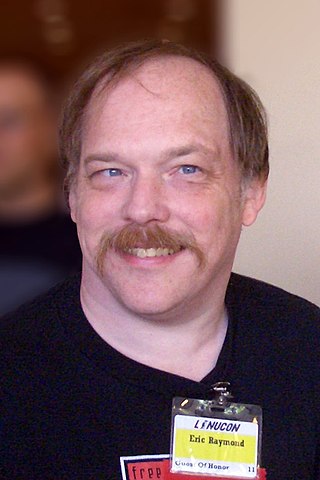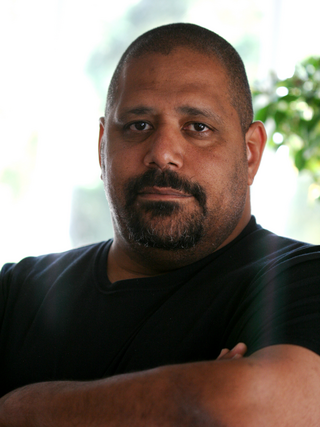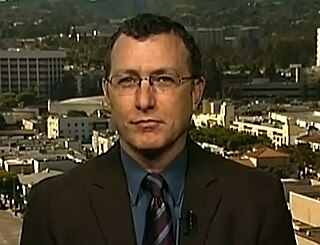
Bruce Perens is an American computer programmer and advocate in the free software movement. He created The Open Source Definition and published the first formal announcement and manifesto of open source. He co-founded the Open Source Initiative (OSI) with Eric S. Raymond.

Eric Steven Raymond, often referred to as ESR, is an American software developer, open-source software advocate, and author of the 1997 essay and 1999 book The Cathedral and the Bazaar. He wrote a guidebook for the Roguelike game NetHack. In the 1990s, he edited and updated the Jargon File, published as The New Hacker's Dictionary.
The free software movement is a social movement with the goal of obtaining and guaranteeing certain freedoms for software users, namely the freedoms to run, study, modify, and share copies of software. Software which meets these requirements, The Four Essential Freedoms of Free Software, is termed free software.
In software engineering, a project fork happens when developers take a copy of source code from one software package and start independent development on it, creating a distinct and separate piece of software. The term often implies not merely a development branch, but also a split in the developer community; as such, it is a form of schism. Grounds for forking are varying user preferences and stagnated or discontinued development of the original software.
Free Java implementations are software projects that implement Oracle's Java technologies and are distributed under free software licences, making them free software. Sun released most of its Java source code as free software in May 2007, so it can now almost be considered a free Java implementation. Java implementations include compilers, runtimes, class libraries, etc. Advocates of free and open source software refer to free or open source Java virtual machine software as free runtimes or free Java runtimes.

Jon "maddog" Hall is the board chair for the Linux Professional Institute.

Open-source hardware consists of physical artifacts of technology designed and offered by the open-design movement. Both free and open-source software (FOSS) and open-source hardware are created by this open-source culture movement and apply a like concept to a variety of components. It is sometimes, thus, referred to as FOSH. The term usually means that information about the hardware is easily discerned so that others can make it – coupling it closely to the maker movement. Hardware design, in addition to the software that drives the hardware, are all released under free/libre terms. The original sharer gains feedback and potentially improvements on the design from the FOSH community. There is now significant evidence that such sharing can drive a high return on investment for the scientific community.

Free and open-source software (FOSS) is software that is available under a license that grants the right to use, modify, and distribute the software, modified or not, to everyone free of charge. The public availability of the source code is, therefore, a necessary but not sufficient condition. FOSS is an inclusive umbrella term for free software and open-source software. FOSS is in contrast to proprietary software, where the software is under restrictive copyright or licensing and the source code is hidden from the users.

The adjective free in English is commonly used in one of two meanings: "at no monetary cost" (gratis) or "with little or no restriction" (libre). This ambiguity can cause issues where the distinction is important, as it often is in dealing with laws concerning the use of information, such as copyright and patents.

Brian Jhan Fox is an American computer programmer and free software advocate. He is the original author of the GNU Bash shell, which he announced as a beta in June 1989. He continued as the primary maintainer of bash until at least early 1993. Fox also built the first interactive online banking software in the U.S. for Wells Fargo in 1995, and he created an open source election system in 2008.
A technology evangelist is a person who builds a critical mass of support for a given technology, and then establishes it as a technical standard in a market that is subject to network effects. The word evangelism is borrowed from the context of religious evangelism due to the similarity of sharing information about a particular concept with the intention of having others adopt that concept. This is typically accomplished by showcasing the potential uses and benefits of a technology to help others understand how they can use it for themselves.

Windows CardSpace is a discontinued identity selector app by Microsoft. It stores references to digital identities of the users, presenting them as visual information cards. CardSpace provides a consistent UI designed to help people to easily and securely use these identities in applications and web sites where they are accepted. Resistance to phishing attacks and adherence to Kim Cameron's "7 Laws of Identity" were goals in its design.
Podcasts, previously known as "audioblogs", have roots dating back to the 1980s. With the advent of broadband Internet access and portable digital audio playback devices such as the iPod, podcasting began to catch hold in late 2004. Today there are more than 115,000 English-language podcasts available on the Internet, and dozens of websites available for distribution at little or no cost to the producer or listener.

The Pirate Party is a political party in Sweden founded in 2006. Its sudden popularity has given rise to parties with the same name and similar goals in Europe and worldwide, forming the International Pirate Party movement.

Jokosher is a free software, non-linear multi-track digital audio editor, released under the GPL-2.0-only. It is written in Python, using the GTK+ interface and GStreamer as an audio back-end, initially just for the Linux operating system but also with support for Windows.
MyEclipse is a commercially available Java EE IDE created and maintained by the company Genuitec, a founding member of the Eclipse Foundation.
Family.Show is a free and open-source genealogy program written in C# and running on the .NET Framework. Microsoft partnered with and commissioned Vertigo Software in 2006 to create it as a reference application for Microsoft's latest UI technology and software deployment mechanism at the time, Windows Presentation Foundation and ClickOnce. The source code has originally been published on Microsoft's CodePlex website. It has since been forked and development continues independent of Microsoft on GitHub.

Bradley Louis Friedman is an American blogger, journalist, actor, radio broadcaster, director and software programmer, most known for his criticism of election integrity issues in the United States. Friedman graduated from Interlochen Arts Academy in 1983 and received a BFA from New York University's (NYU) Tisch School of the Arts in 1988.
The open-source-software movement is a movement that supports the use of open-source licenses for some or all software, as part of the broader notion of open collaboration. The open-source movement was started to spread the concept/idea of open-source software.










